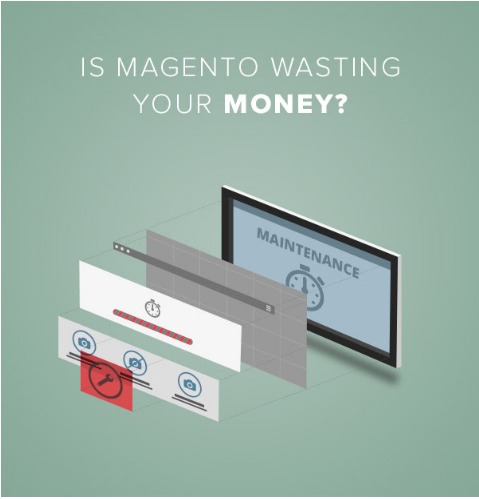Miva Merchant often takes the time to attack their eCommerce competitors directly. Maybe you’ve seen the following ad:

This ad, sent via email campaign, continues to say,
“Updating crucial security patches is infamously slow on Magento, commonly breaking the functionality of mods and plugins. The tortured development history of Magento means that every back-end integration requires an expensive custom build and painstaking IT maintenance…”
All “fresh” software releases hold inherent bugs and glitches that need to be worked out. So Miva’s attacks aren’t invalid, but it’s hard not to wonder why they’re attacking at all. Miva’s smear campaign doesn’t stop there. In the company’s own article, they claim that running a Magento Enterprise site is roughly twice the cost of a Miva platform, and not worth it. In another email they claim:
“Upgrading Magento software is expensive and dangerous. The transition from Magento 1.92 to 2.0 was a nightmare for store owners, with even the simple transfer of customer data requiring expensive 3rd-party tools. Magento updates are famous for breaking stores, with custom mods and plug-ins requiring expensive deployment to adapt.”
Miva Merchant shouldn’t be criticizing Magento. The cloud-based platform has great customer service and is easy to update, but isn’t actually in Magento’s league. Atlantic BT is currently preparing to launch a new client site supported by Magento 2. We’ve seen first hand the quality of services it provides for us and our partners and would recommend it to any client looking to rebuild their site.
The SaaS-based software shows that Miva shares more with Shopify than Magento. It limits your ability to do custom features and setup. Like Shopify, it’s a solid platform. However, it’s not likely to attract larger businesses that would use Magento. The businesses that Miva is targeting in their email campaign are likely wanting a custom set up with a unique look and feel. Unfortunately, you’re not going to find these options with Miva.
Additionally, think about the last time you heard about Miva. Probably never, right? Miva has been around for 18 years. It was actually one of the first eCommerce platforms to be created. You know people that use Shopify, WooCommerce, and even WordPress eCommerce solutions, but, despite their seniority, Miva? Hear those crickets? . From their size to the language they use, here are 3 reasons Miva shouldn’t even try to compare itself to Magento.
1. Few Businesses Actually Use it
Go ahead and look up “Top eCommerce Platforms.” Which names do you find? Magento, WooCommerce, Shopify, and even SquareSpace. These results all come before Miva. When you look at the numbers, Miva doesn’t even make the top 10.
On their website, it says “Miva customers have processed over $100 billion in online sales since 1997.” Assuming this number is true, it certainly didn’t happen recently. Since the beginning of this year, Miva Merchant added 10 websites and lost 18. By comparison. Magento gained 2,071 websites.. More specifically, it is used by over 150,000 online stores and powers 15% of the Alexa Top 1 Million. Out of the 415 eCommerce platforms in that category, Magento ranks #2.
Even when you put Miva head-to-head against WooCommerce and Shopify, it falls short. Only 0.2% of eCommerce sites have been using it. Want the exact numbers? That’s just 2,332 businesses. There are “approximately 110,000 eCommerce websites generating revenue of meaningful scale on the internet.” That’s not just eCommerce sites this year. That’s all eCommerce sites which are actually doing well. Assuming all of these Miva sites are generating enough revenue, they only constitute 2.2% of eCommerce sites.
Despite their numerous years as an eCommerce platform, Miva doesn’t make the cut for most customers. It seems attacking another platform is the only way to get visibility.
2. More Aesthetics, Less Structure
Miva focuses more on the look of an eCommerce website than the structure behind it. They use a HTML/CSS-based content management system to allow business owners to create and manage their eCommerce websites. That comes with the capability to upload and edit product descriptions and images, track and manage incoming and outgoing inventory, and securely process customer orders.
While Magento has similar customization features, there is more emphasis on structure. Using a MySQLdatabase management system, PHP, and elements of the Zend Framework, Magento applies the conventions of object-oriented programming and model–view–controller architecture.
So what’s the difference?
Magento is a better program for people who have systems in place and want a platform to help organize those systems. This means sites that use Magento will also have people in place to manage that infrastructure and handle a more database- and function-heavy platform. Miva is half the cost because it’s better for people starting from scratch. If you’re looking for a strong backbone your team can use to run a larger eCommerce business, forget about using Miva.
3. Scale Matters
Miva Merchant is half the cost because it’s intended for businesses half the size (or less) of the ones using Magento. Although Miva claims it’s a better solution for enterprise than Magento, its strength lies in small business. It is entirely cloud-based, which is ideal for smaller businesses who lack the infrastructure and software needed to power a successful eCommerce enterprise. In addition, it excludes some areas of business—Miva doesn’t host for retailers with soft goods (meaning services or downloadable products).
Magento is designed with larger businesses in mind. Yes, managing the code base, all the updates and patches, and troubleshooting for security can be complicated. It takes more to run an enterprise-level business. For a large business processing thousands of payments every day and managing hundreds of products, you need more than HTML and CSS—you need a platform built for growth. From managing the databases to keeping it secure, you need a team to keep it going. Only Magento’s high power and functionality has the capacity for enterprise.
The Bottom Line
All of that aside, Miva Merchant does have some advantages which Magento needs to learn from. Miva excels in providing helpful support and customer service no matter what package their clients select. For Magento, this simply isn’t true. Despite the strength of the platform, Magento Community customers are pretty much on their own. Even Enterprise users have a hard time getting the help they need. That said, Miva has a bad record in terms of hidden charges and surges in cost. Magento may be expensive, but at least you know what the price is going to be.
If you’re established and have the staff you need on Magento, stay there. It may be complicated, but moving to a completely different language in the cloud isn’t going to solve your problems. Whether you use Enterprise or Community, you don’t have to feel alone. Are you having issues getting the support you need? Don’t switch over to Miva. At Atlantic BT we can provide the same level of support and beyond. As a Certified Magento Partner, we have the expertise you need to keep your platform running safely. Check out our eCommerce page to learn more.







